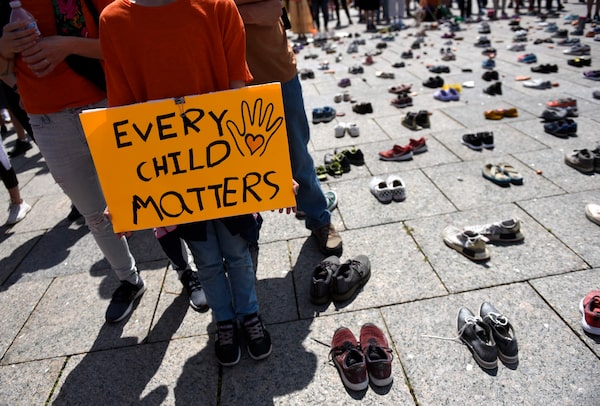
People stand on Parliament Hill alongside a memorial for children who died at residential schools during a rally, in Ottawa on July 31, 2021.Justin Tang/The Canadian Press
Indigenous organizations in Manitoba, officials from the city of Winnipeg and the provincial and federal governments are forming a council to support searches for burial sites of children who attended residential schools.
Reconciliation Minister Alan Lagimodiere says they will work together to provide guidance on how best to support the Indigenous-led searches.
The Southern Chiefs’ Organization and the province will co-chair the council, which includes representatives from First Nations, Métis and Inuit groups.
Principles for the work are to include putting families and survivors at the heart of all search efforts, offering health supports and protecting burial locations and remains.
The province previously committed $2.5-million to support identification, investigation, protection and commemoration of children who died while attending residential schools.
The province says in a news release there were six First Nation communities in Manitoba actively carrying out searches using ground-penetrating radar as of last December.
The council will also include representatives from residential school health support programs, tribal councils and the National Centre for Truth and Reconciliation.
“Indigenous leaders, governments, organizations, communities, elders, knowledge keepers and, most importantly, survivors and families must lead the way as we implement the Truth and Reconciliation Commission’s calls to action and locate missing children who died attending residential schools,” Mr. Lagimodiere said in a release.
The National Centre for Truth and Reconciliation has documented more than 4,000 children who died at residential schools, though it is believed that number is higher. The centre says the Indian Residential Schools Settlement Agreement recognized 14 schools in Manitoba.
“I am pleased to see our relatives and partners, including our treaty partners, coming together to ensure that … we collectively do everything we can to locate those missing children, which is such a vital component of the truth and reconciliation process,” said Grand Chief Jerry Daniels of the southern chiefs.
The Indian Residential Schools Resolution Health Support Program has a hotline to help residential school survivors and their relatives suffering with trauma invoked by the recall of past abuse. The number is 1-866-925-4419.
This story was produced with the financial assistance of the Meta and Canadian Press News Fellowship
Our Morning Update and Evening Update newsletters are written by Globe editors, giving you a concise summary of the day’s most important headlines. Sign up today.